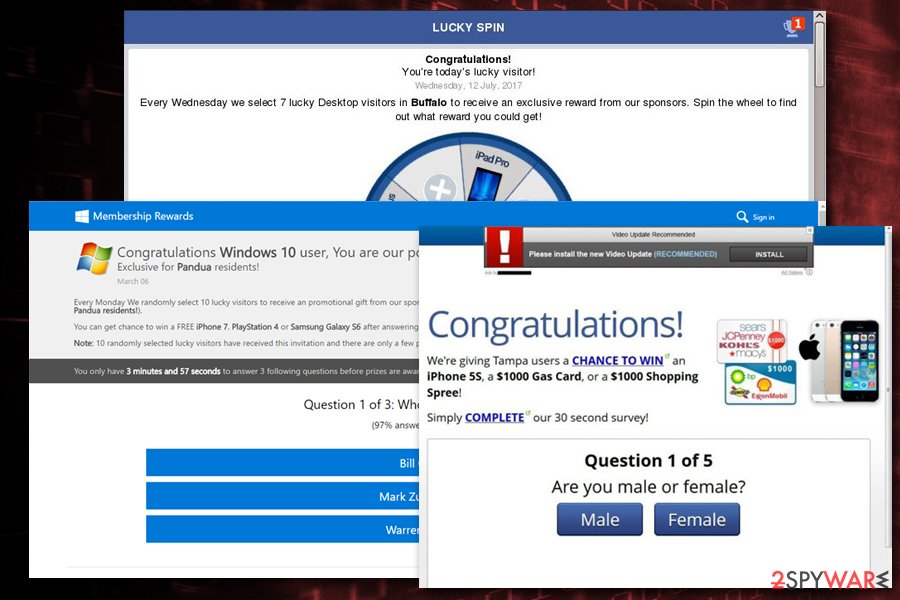Baby Setup virus (Removal Guide) - Jul 2018 update
Baby Setup virus Removal Guide
What is Baby Setup virus?
Baby Setup virus – an adware application that may cause havoc on your PC

Baby Setup virus is an adware[1] program that stealthily enters users' devices and aims to overload Google Chrome, IE or Mozilla Firefox with obnoxious advertisements. The presence of the dubious application might not be noticed straight away because of its silent infiltration technique. Nevertheless, users can see Baby Setup virus effects as soon as they load their browsers – redirects bring them to questionable sites, pop-ups hinder the content of legitimate domains, and even search results are plagued by sponsored links. The moan goal of such behavior is to monetize on compromised victims' browsing activity, as pay-per-click revenue is a perfect strategy for adware authors. Fortunately, Baby Setup virus is not a serious threat, such as ransomware or a keylogger, and can be deleted without much troubles in most cases.
| Name | Baby Setup virus |
|---|---|
| Type | Adware |
| Danger level | Medium. Affects only browsers. |
| Browsers infected | Google Chrome, Mozilla Firefox, Internet Explorer, Microsoft Edge, etc. |
| Affects OS such as | Windows, Mac |
| Distributes by | Bundled, dubious sites, links. |
| Deletion | Use FortectIntego to get rid of the PUP. |
Numerous advertisements are not the only negative effect of Baby Setup virus. According to Senzavirus.it,[2] such adware-type application can also collect various non-personal details about its victim: search queries, computer's location, bookmarks, keystrokes, IP address, and other information.
The anonymous information gathering is vital to any marketing campaign (including Baby Setup virus), as it allows to display targeted advertisement, increasing profits and traffic to sponsored domains. Unfortunately, in some rare cases, even particular personal details might be gathered. Although it is not a very common occurrence, better to avoid such risk.
Additionally, your browsers (Chrome, Edge, Firefox, and others) are filled with Baby Setup virus adverts such as:
- Pop-unders;
- Pop-ups;
- Banners;
- Coupons;
- Blinking boxes;
- Auto-play video ads, etc.
If you notice such symptoms, do not hesitate to initiate Baby Setup virus removal process on your computer. It will help you restore your browser back to normal state.

Furthermore, Baby Setup virus ads are placed all over your favorite websites, making web browsing difficult and slowing it down considerably. Additionally, redirects can lead to dubious sites filled with malicious content. These kinds of web pages might promote other PUPS or install even more serious threats, such as Trojans or ransomware.
To sum up, although Baby Setup virus is not that harmful as a Trojan horse or a ransomware-type virus, it still is potentially unwanted, and you need to remove Baby Setup virus when you spot it for the first time. Use FortectIntego to avoid further damaging consequences.
Adware is distributed via software bundles
Most commonly, PUPs such as adware and browser hijackers are spread through a method called “bundling.” Dubious programs are included into installers of the regular ones and are infiltrated into the system secretly. What is most alarming, is that users often skip installation steps or use third-party installers and put themselves at risk of an adware infection.
To avoid adware, you need to learn that the key to safety is in your awareness. If you be cautious enough while surfing the Internet, you will increase your safety level automatically. Not less important is to know that you should download your software only from trusted sources, and always check the incoming downloads in the Custom/Advanced settings section[3].
Some piece of advice is to install an antivirus program. Professional protection is needed to detect threats that a person might not notice, and help to clean the system.
Get rid of Baby Setup virus from PC and browsers

To remove Baby Setup virus from your computer and Google Chrome, Mozilla Firefox, or other browsers, you will need to eliminate a few components. Delete all adware-related browser extensions, dubious apps, and browser plug-ins via Control Panel and clean every web browser manually. Instructions for this method are displayed below.
If you would like to execute Baby Setup virus in a faster way, you can choose to install anti-malware software to do all the work for you. These high-profile tools that we recommend have been tested by our experts to ensure the successful elimination of the Baby Setup virus.
You may remove virus damage with a help of FortectIntego. SpyHunter 5Combo Cleaner and Malwarebytes are recommended to detect potentially unwanted programs and viruses with all their files and registry entries that are related to them.
Getting rid of Baby Setup virus. Follow these steps
Uninstall from Windows
To eliminate adware from your Windows OS, follow these steps:
Instructions for Windows 10/8 machines:
- Enter Control Panel into Windows search box and hit Enter or click on the search result.
- Under Programs, select Uninstall a program.

- From the list, find the entry of the suspicious program.
- Right-click on the application and select Uninstall.
- If User Account Control shows up, click Yes.
- Wait till uninstallation process is complete and click OK.

If you are Windows 7/XP user, proceed with the following instructions:
- Click on Windows Start > Control Panel located on the right pane (if you are Windows XP user, click on Add/Remove Programs).
- In Control Panel, select Programs > Uninstall a program.

- Pick the unwanted application by clicking on it once.
- At the top, click Uninstall/Change.
- In the confirmation prompt, pick Yes.
- Click OK once the removal process is finished.
Delete from macOS
Remove items from Applications folder:
- From the menu bar, select Go > Applications.
- In the Applications folder, look for all related entries.
- Click on the app and drag it to Trash (or right-click and pick Move to Trash)

To fully remove an unwanted app, you need to access Application Support, LaunchAgents, and LaunchDaemons folders and delete relevant files:
- Select Go > Go to Folder.
- Enter /Library/Application Support and click Go or press Enter.
- In the Application Support folder, look for any dubious entries and then delete them.
- Now enter /Library/LaunchAgents and /Library/LaunchDaemons folders the same way and terminate all the related .plist files.

Remove from Microsoft Edge
Delete unwanted extensions from MS Edge:
- Select Menu (three horizontal dots at the top-right of the browser window) and pick Extensions.
- From the list, pick the extension and click on the Gear icon.
- Click on Uninstall at the bottom.

Clear cookies and other browser data:
- Click on the Menu (three horizontal dots at the top-right of the browser window) and select Privacy & security.
- Under Clear browsing data, pick Choose what to clear.
- Select everything (apart from passwords, although you might want to include Media licenses as well, if applicable) and click on Clear.

Restore new tab and homepage settings:
- Click the menu icon and choose Settings.
- Then find On startup section.
- Click Disable if you found any suspicious domain.
Reset MS Edge if the above steps did not work:
- Press on Ctrl + Shift + Esc to open Task Manager.
- Click on More details arrow at the bottom of the window.
- Select Details tab.
- Now scroll down and locate every entry with Microsoft Edge name in it. Right-click on each of them and select End Task to stop MS Edge from running.

If this solution failed to help you, you need to use an advanced Edge reset method. Note that you need to backup your data before proceeding.
- Find the following folder on your computer: C:\\Users\\%username%\\AppData\\Local\\Packages\\Microsoft.MicrosoftEdge_8wekyb3d8bbwe.
- Press Ctrl + A on your keyboard to select all folders.
- Right-click on them and pick Delete

- Now right-click on the Start button and pick Windows PowerShell (Admin).
- When the new window opens, copy and paste the following command, and then press Enter:
Get-AppXPackage -AllUsers -Name Microsoft.MicrosoftEdge | Foreach {Add-AppxPackage -DisableDevelopmentMode -Register “$($_.InstallLocation)\\AppXManifest.xml” -Verbose

Instructions for Chromium-based Edge
Delete extensions from MS Edge (Chromium):
- Open Edge and click select Settings > Extensions.
- Delete unwanted extensions by clicking Remove.

Clear cache and site data:
- Click on Menu and go to Settings.
- Select Privacy, search and services.
- Under Clear browsing data, pick Choose what to clear.
- Under Time range, pick All time.
- Select Clear now.

Reset Chromium-based MS Edge:
- Click on Menu and select Settings.
- On the left side, pick Reset settings.
- Select Restore settings to their default values.
- Confirm with Reset.

Remove from Mozilla Firefox (FF)
Remove dangerous extensions:
- Open Mozilla Firefox browser and click on the Menu (three horizontal lines at the top-right of the window).
- Select Add-ons.
- In here, select unwanted plugin and click Remove.

Reset the homepage:
- Click three horizontal lines at the top right corner to open the menu.
- Choose Options.
- Under Home options, enter your preferred site that will open every time you newly open the Mozilla Firefox.
Clear cookies and site data:
- Click Menu and pick Settings.
- Go to Privacy & Security section.
- Scroll down to locate Cookies and Site Data.
- Click on Clear Data…
- Select Cookies and Site Data, as well as Cached Web Content and press Clear.

Reset Mozilla Firefox
If clearing the browser as explained above did not help, reset Mozilla Firefox:
- Open Mozilla Firefox browser and click the Menu.
- Go to Help and then choose Troubleshooting Information.

- Under Give Firefox a tune up section, click on Refresh Firefox…
- Once the pop-up shows up, confirm the action by pressing on Refresh Firefox.

Remove from Google Chrome
Reset your Google Chrome browser to get rid of adware for good:
Delete malicious extensions from Google Chrome:
- Open Google Chrome, click on the Menu (three vertical dots at the top-right corner) and select More tools > Extensions.
- In the newly opened window, you will see all the installed extensions. Uninstall all the suspicious plugins that might be related to the unwanted program by clicking Remove.

Clear cache and web data from Chrome:
- Click on Menu and pick Settings.
- Under Privacy and security, select Clear browsing data.
- Select Browsing history, Cookies and other site data, as well as Cached images and files.
- Click Clear data.

Change your homepage:
- Click menu and choose Settings.
- Look for a suspicious site in the On startup section.
- Click on Open a specific or set of pages and click on three dots to find the Remove option.
Reset Google Chrome:
If the previous methods did not help you, reset Google Chrome to eliminate all the unwanted components:
- Click on Menu and select Settings.
- In the Settings, scroll down and click Advanced.
- Scroll down and locate Reset and clean up section.
- Now click Restore settings to their original defaults.
- Confirm with Reset settings.

Delete from Safari
Remove unwanted extensions from Safari:
- Click Safari > Preferences…
- In the new window, pick Extensions.
- Select the unwanted extension and select Uninstall.

Clear cookies and other website data from Safari:
- Click Safari > Clear History…
- From the drop-down menu under Clear, pick all history.
- Confirm with Clear History.

Reset Safari if the above-mentioned steps did not help you:
- Click Safari > Preferences…
- Go to Advanced tab.
- Tick the Show Develop menu in menu bar.
- From the menu bar, click Develop, and then select Empty Caches.

After uninstalling this potentially unwanted program (PUP) and fixing each of your web browsers, we recommend you to scan your PC system with a reputable anti-spyware. This will help you to get rid of Baby Setup registry traces and will also identify related parasites or possible malware infections on your computer. For that you can use our top-rated malware remover: FortectIntego, SpyHunter 5Combo Cleaner or Malwarebytes.
How to prevent from getting adware
Protect your privacy – employ a VPN
There are several ways how to make your online time more private – you can access an incognito tab. However, there is no secret that even in this mode, you are tracked for advertising purposes. There is a way to add an extra layer of protection and create a completely anonymous web browsing practice with the help of Private Internet Access VPN. This software reroutes traffic through different servers, thus leaving your IP address and geolocation in disguise. Besides, it is based on a strict no-log policy, meaning that no data will be recorded, leaked, and available for both first and third parties. The combination of a secure web browser and Private Internet Access VPN will let you browse the Internet without a feeling of being spied or targeted by criminals.
No backups? No problem. Use a data recovery tool
If you wonder how data loss can occur, you should not look any further for answers – human errors, malware attacks, hardware failures, power cuts, natural disasters, or even simple negligence. In some cases, lost files are extremely important, and many straight out panic when such an unfortunate course of events happen. Due to this, you should always ensure that you prepare proper data backups on a regular basis.
If you were caught by surprise and did not have any backups to restore your files from, not everything is lost. Data Recovery Pro is one of the leading file recovery solutions you can find on the market – it is likely to restore even lost emails or data located on an external device.
- ^ Adware. Kaspersky Lab. Resource center.
- ^ SenzaVirus. IT professionals' tips.
- ^ Mark Allen. Adware Prevention. Comptechdoc. All about computers.
